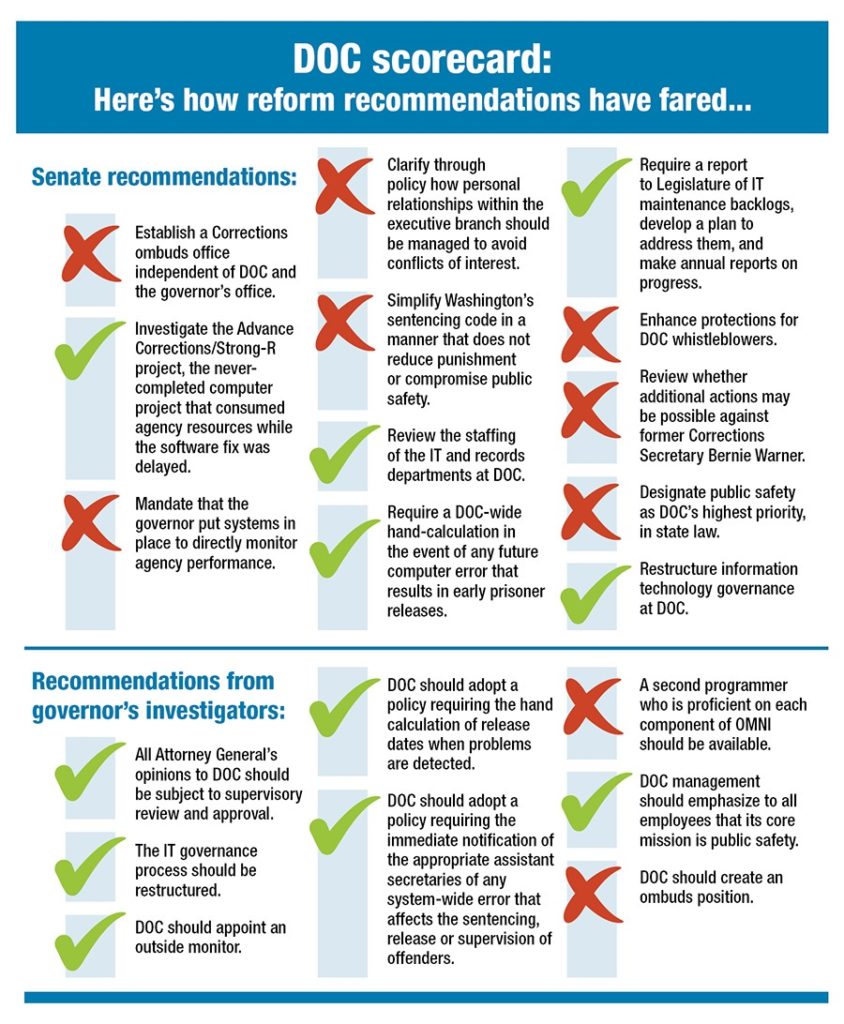OLYMPIA – Another major sentencing error at the state Department of Corrections is prompting frustration from Senate Republicans who urged sweeping reforms for the agency in the wake of the last one.
Sens. Mike Padden, R-Spokane Valley, and Steve O’Ban, R-University Place, said they were stunned to learn of a second major computer error so soon after Corrections officials and the governor’s office proclaimed the problem solved. O’Ban said he will file a public records request with the governor’s office and the Department of Corrections seeking records and other correspondence on the issue. In a meeting with Padden two weeks ago, Corrections officials disclosed a minor sentencing problem involving two early releases, but failed to mention thousands more cases are being reviewed.
“It is nothing less than astonishing that I had to find out about this from the press,” O’Ban said. “It’s just as bad that we have to file a formal records request to get to the bottom of it. Three years after the last sentencing scandal, it appears the culture of the agency has not changed. When Corrections keeps something like this from the two senators who led the Senate’s previous investigation, it does not inspire confidence.”
In a repeat of the last sentencing scandal, the Department of Corrections has acknowledged that its computers continue to miscalculate inmate sentences – as many as 3,500 cases. The error, revealed to the public by the Seattle Times in a story posted Monday, involves offenders returned to prison after violating terms of community supervision programs.
The Times reports that the Department of Corrections has detailed 50 staffers for a case-by-case review of inmate sentences. Preliminary investigation shows some offenders were released early and some were released late. The Times story indicates that the department learned of the problem last year.
The earlier sentencing scandal involved the same computerized sentencing system, known as OMNI. Over a 13-year period, approximately 3,000 violent and dangerous felons were released before their sentences had concluded, some of them committing new crimes while they were supposed to be behind bars. Two of those cases resulted in death, a murder in Spokane and a DUI fatality in Bellevue. The Department of Corrections never completed a full accounting, making it impossible to determine precisely how many inmates were involved and how many were charged with new crimes
Padden, currently ranking Republican on the Senate Law and Justice Committee, teamed with O’Ban to lead an independent Senate investigation into the matter in 2016. At the same time, the governor also commissioned a more-narrowly-focused investigation that failed to examine the responsibility of upper-level DOC managers and his own office.
Both investigations recommended major reforms, including better monitoring of agency performance by the governor’s office and the hiring of additional programmers qualified to make fixes to agency software. A bill enacting legislative recommendations (SB 5294) was passed by the Senate in 2017, but was quashed by the governor’s office when it reached the House.
“If we’d passed that bill, I don’t think we’d be back here today talking about the same issue,” said Padden, who sponsored the 2017 legislation. “The governor asked the public to trust him that all problems would be resolved. Unfortunately, sweeping them under the rug didn’t do the trick.”
Padden and O’Ban noted that Democrats are now in control of both chambers of the Legislature, and it will be up to them to decide whether to investigate DOC and the governor’s management of the agency. The governor also is a Democrat. The senators said DOC’s repeat offense offers ample illustration of the point they made in 2016 – that management is the issue, not a problem with computer software.
“Here we go again,” O’Ban said. “I certainly hope this time no one tries to excuse this as a ‘software glitch,’ The problem doesn’t lie with the machines, but rather with the people who manage them. And ultimately those who are responsible are the ones at the top.”
Scorecard depicts recommendations implemented and ignored in 2017

Note: A Department of Corrections ombuds program was launched in 2018 (HB 1889), but the program is not independent – it is housed within the governor’s office – and it serves only inmates and their families, not Department of Corrections employees.










